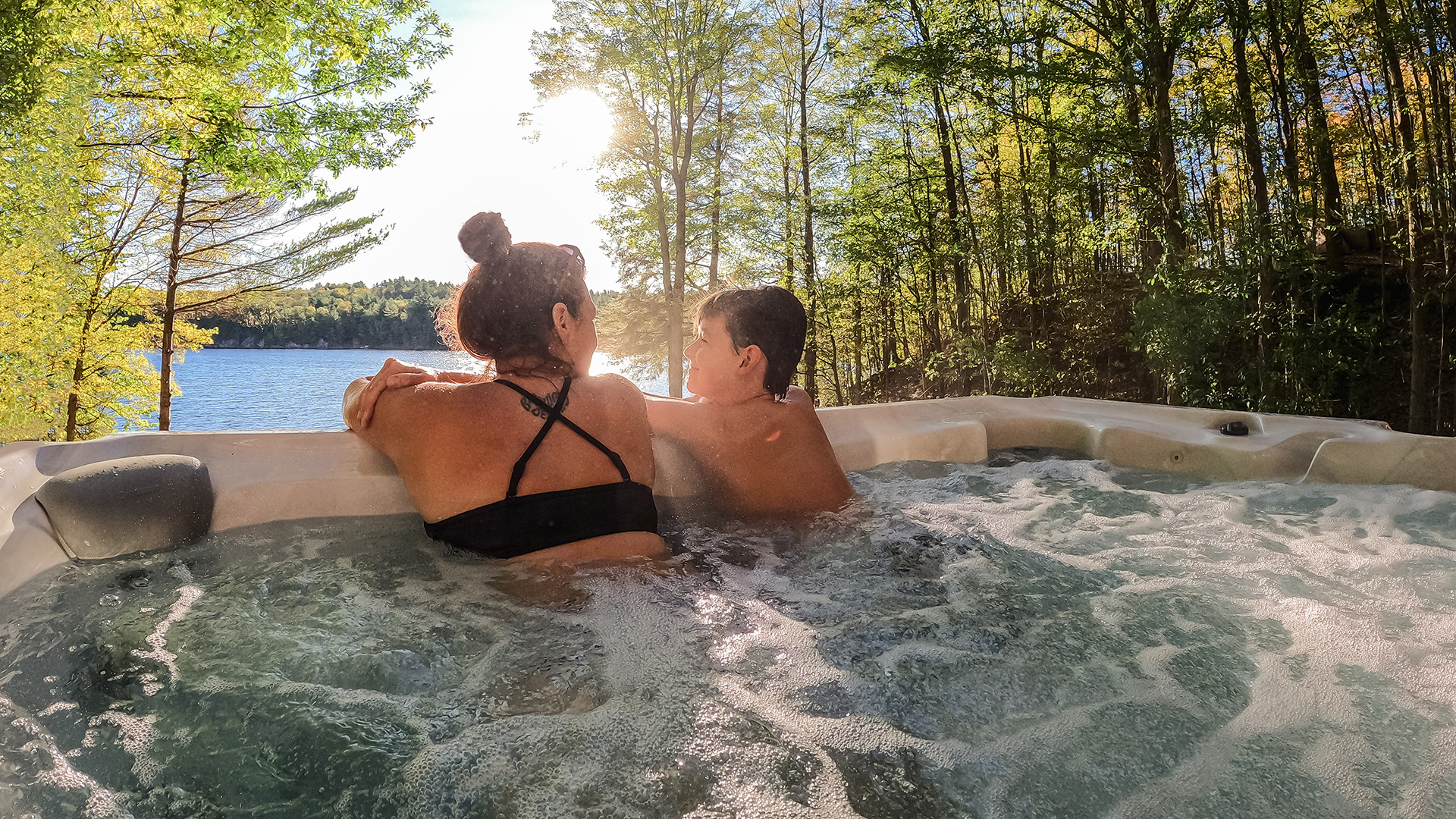Hot tub vs Jacuzzi: which is best?
Narrow down what’s best for your needs

When it comes to telling apart a hot tub from a Jacuzzi, it’s normal to feel puzzled. Nowadays, the two words are used almost interchangeably. However, they have a slightly different meaning. Jacuzzi is to ‘hot tub’ like Google is to ‘search engine’. Hot tub is an umbrella term used to refer to any heated tub that holds water. On the other hand, Jacuzzi is the name of the brand that invented the first hot tub and brought the contraption to the mass market.
Determined to treat a family member’s rheumatoid arthritis, the Jacuzzi brothers invented the portable J-300 hydrotherapy pump in 1956. The first integrated whirlpool bath followed in 1968, and following the success of their hot tub products, other hot tub designs were launched by different brands.
Essentially, while you can only buy a Jacuzzi hot tub from one specific brand, you can get your hands on a hot tub from any number of brands. Master Spas, Sundance Spas, and Hot Spring all have their own take on the best hot tubs and the best swim spa designs.
Hot tubs and Jacuzzis have several subtle differences, so we’ve taken care to lay out the exact pros and cons of hot tubs vs Jacuzzis. Hot tubs and Jacuzzis can both be used for leisure or hydrotherapy, although Jacuzzi has a keener reputation for the latter. With a hot tub, it’s very easy to find a model that fits your hydrotherapy, aesthetic, or leisure needs. On the flip side, the Jacuzzi is best known for its classic cabinetry and superior hydrotherapy.
Read on to discover the differences and similarities between hot tubs and Jacuzzis, as well as tips on weighing up your options when it comes to purchasing. Plus, we’ve talked to registered physiotherapist Katie Knapton of PhysioFastOnline to hear more about the benefits of hydrotherapy for tired and aching muscles.
Hot tubs vs Jacuzzi: Differences
Registered physiotherapist Katie Knapton says, “Spending some time in a hot tub or Jacuzzi can help to relax the muscles and give some pain relief if you have discomfort. It can be a great place to do some gentle movements of the affected area, especially the knees and hips. If you’re undergoing physiotherapy, regular use of a hot tub or Jacuzzi alongside a specific rehabilitation program can be useful too.”
Although people often use either term, hot tubs are a generic term for a tub that you can fill with water and soak in, whilst Jacuzzi is a brand name for a specific type of hot tub. Think of people using Hoover for a vacuum cleaner, and you get the general idea.
Jacuzzi is known for its wide range of hot tubs, though they tend to be at the more expensive end of the market. Founded to offer hydrotherapy to people with arthritis in the ‘60s, it quickly became the go-to brand in the ‘70s and ‘80s for wealthy people who wanted a luxury spa experience at home.
Sign up to receive the latest news, reviews, buying guides and deals direct to your inbox
Every one of the Jacuzzi’s hot tubs is fitted with patented jet technology, and the capacity ranges from 2 to 6+ people. Higher-end models come equipped with LED lights, connected apps, lounge seating, built-in stereos, waterfall features, and more. You can also buy Jacuzzis that are designed to swim in, with currents that keep you in place while you get a full workout.
Jacuzzi makes much of its patented technologies that are unique to the brand. It also has a great reputation for quality and reliability. All Jacuzzi hot tubs are put through what the company calls “rigorous independent testing” by the California Energy Commission. Jacuzzi claims this means their hot tubs are some of the most energy-efficient tubs you can buy.
It’s a testament to the success of Jacuzzi that its name has become synonymous with hot tubs. However, there are plenty of other fantastic hot tub brands to choose from that feature affordable options, such as Master Spas Hot Tubs and Intex Inflatable Hot Tubs or luxury tubs, such as Bullfrog Spas and PDC Spas.
Hot tubs have come a long way in the last decade. You can now find hot tubs that offer everything a Jacuzzi can, and sometimes at much cheaper prices.
While jacuzzis tend to have a classic design and cabinetry on the exterior, you can get a wide variety of hot tubs in all shapes, sizes, colors, and finishes. Round hot tubs with wood finishes give a clean Scandi look, while inflatable options are easily packed away when not in use. You can even purchase wood-fired hot tubs for an authentic Nordic soak.
Hot tubs vs Jacuzzi: Similarities
Both hot tubs and Jacuzzis offer a relaxing hydrotherapy experience in the comfort of your own home or backyard. Both offer multiple jets to pummel and massage aching muscles, while you can easily find hot tubs that offer the same extra features as Jacuzzis, such as control panels, LED lighting, Bluetooth sound systems, and contoured seats.
You can even find hot tubs that offer a swim experience, although these are usually marketed as swim spas or swim machines.
Pros and cons of hot tubs
If you want to keep your options open, browsing different hot tub brands is the best course of action. While Master Spas hot tubs are well-known for budget-friendly designs that can fit into smaller backyards, other hot tub brands have a fierce reputation for smart features or powerful jets that will soothe and massage your muscles.
Since every hot tub brand has a different idea of what makes a great hot tub and its own unique product range, there’s a high chance that you’ll find a hot tub that matches your vision. Therefore, the main advantage of buying a hot tub over a Jacuzzi is variety. Jacuzzi is known for its classic hot tub design, but hot tubs experiment with many different styles.
A Scandinavian barrel or wooden hot tub can fit in with warm or earthy backyard tones. There are wood-fired hot tubs, which heat up quickly, or inflatable hot tubs, which can be packed away quickly in the winter and represent the best budget option. Insulated hot tubs, also easily available, will keep you feeling toasty in colder weather conditions too.
This variety also extends to hot tub features. Whether you desire a very specific number of jets or want to personalize your tub with LED lights, control panels, Bluetooth, contoured seats, or beverage coolers, it’s likely that you can find a hot tub that does it all.
The only thing is, if you do choose to invest in a budget-friendly hot tub rather than a luxury Jacuzzi, it’s likely you’ll have to be willing to sacrifice higher-end features such as powerful jets, enhanced sanitation, and Wi-Fi capabilities.
Similarly, while Jacuzzi has spent 60 years developing its hydrotherapy formula, many hot tubs fall short of providing adequate relief from aches and pains. Those who want to treat arthritis or joint pain might have a harder time finding a good solution with other hot tub brands.
Pros and cons of Jacuzzis
It’s no secret that when it comes to hydrotherapy, Jacuzzis have one of the most well-developed hot tub designs. This comes hand-in-hand with having 60 years to develop an effective hydrotherapy formula.
Since the 1950s, the brand has come up with features such as ergonomic seating, branded jets that fit the human muscle composition, and jet technology that can deliver a high-flow, low-pressure massage. Therefore, Jacuzzis are a great option for those who want to treat joint pain, arthritis, or long-term muscle soreness.
If you’re a stickler for the classic hot tub design, Jacuzzi is also a front-runner. Over the years, their classic cabinetry and high backs have grown a significant fan base.
The main downside of choosing a Jacuzzi over a hot tub is that their product range lacks variety. If you’re looking for something different, such as Scandinavian-style cabinetry or a modern design, it’s unlikely you’re going to find that on the Jacuzzi website.
In their favor, the Jacuzzi provides customizable features, so you can personalize your hot tub design slightly. However, this is only a trivial detail when you consider the huge variety of features, shapes, and sizes offered across all other hot tub brands.
When it comes to quality, Jacuzzi is a brand you can count upon. However, while Jacuzzi makes efforts to use heat from the motor to warm the water and has passed independent testing by the California Energy Commission, it has no specific range of energy-efficient hot tubs. Many other hot tub brands have a specific range of designs.
Warranty will also come into play when you’re choosing between a hot tub and a Jacuzzi. Jacuzzi provides warranties of up to 5-10 years, depending upon the design. While this is likely to be satisfactory, you may find that another hot tub brand provides a more generous warranty when you compare the small print side by side.
Hot tub vs Jacuzzi: Price
If you’re on a strict budget, you should approach Jacuzzi with caution. The brand has a reputation for luxury hot tubs.
It has only four entry-level Jacuzzis in its product range, priced between $5000 and $8,999, according to the website. On the other end of the scale, Jacuzzi sells almost double the number of luxury hot tubs, which can set you back by over $19,000. This is also before you’ve taken into account the cost of any extra accessories, such as hot tub covers or steps.
If you’re looking to invest in a hot tub but you’re not willing to spend more than you bargained for, you’ll find that other hot tubs have a wider selection of budget-friendly or mid-level hot tubs.
Granted, you may have to forfeit more luxurious features such as ergonomic therapy lounges or hydromassage jets, but it’s still possible to get a good-quality hot tub for a fraction of the price of a Jacuzzi hot tub.
Reviews
Whirlpool 24" Stainless Steel AI Dishwasher Review
Napoleon TravelQ PRO285 Portable Gas Grill review
Dreame L40 Ultra Robot Vacuum Cleaner and Mop review: almost hands-free cleaning
GE Profile Smart Mixer with Auto Sense review: a powerful, thorough mixer
Echo eForce DPB-2500 review: a leaf blower as a snow removal tool?
DPAS-2100 + Pro Paddle Attachment review: a new way to remove snow this winter?
Midea MAD53109APK 5.5QT Air Fryer review: a small, simple, and highly effective option
Eureka J15 Pro Ultra Robot Vacuum review: hands-free cleaning for busy families
Master Spas has a significantly larger range of budget-friendly hot tubs, with four budget models and seven mid-level models available starting at $6,000. Inflatable hot tubs are another good option to keep the cost down; it’s possible to find an inflatable design for several hundred dollars.
Jacuzzi doesn’t list the exact price of their hot tubs on their website, instead choosing to sort their available hot tubs into four different price brackets labeled as entry-level ($5,000 to $8,999), mid-level ($9,000 to $14,999), premium ($15,000 to $18,999) and luxury (over $19,000).
This pricing strategy is not uncommon. Many hot tub brands adopt similar price brackets on their websites, often with a more time-consuming method of requesting a quote or contacting your local dealer. To unlock more accurate pricing with Jacuzzi, you only need to fill in a form including your name, email address, and zip code before a local dealer contacts you with a quote.
Which should you buy?
When it comes to choosing between a Jacuzzi and a hot tub, the deciding factor will ultimately be your budget. The fact there are a handful of entry-level Jacuzzi models available doesn’t take away from the fact that the majority of their hot tubs will set you back by over $19,000.

Nevertheless, there’s a reason why Jacuzzi has gained a good reputation. The combination of classic designs and hydrotherapy features make it an attractive option for those wanting to treat aches and pains using hydrotherapy and show off their hot tub to friends and family.
As one of the most reputable hot tub brands for hydrotherapy, Jacuzzi has a well-developed, tailored range of hydrotherapy features, such as ergonomic seating and branded jets. This is lacking in many other hot tub designs. While it’s still possible to find hot tubs that have targeted hydrotherapy features, they don’t have the same legacy as Jacuzzi.
The more you’re willing to pay for a hot tub, the easier it is to create a hot tub that closely replicates a Jacuzzi. A hot tub costing around $10,000 should have most of the same features, including high-powered jets, ergonomic seating, and waterfall features.
That’s thousands of dollars less than a Jacuzzi, so if you’re on a budget and willing to compromise on not having the Jacuzzi brand name, a hot tub will be the superior option.

Joanne Lewsley is a reputable freelance writer specializing in evidence-based health and lifestyle content. With a background in journalism and extensive experience working for known brands, Joanne rigorously tests and evaluates home gadgets. Her passion for writing is complemented by her love for the outdoors and live music.
